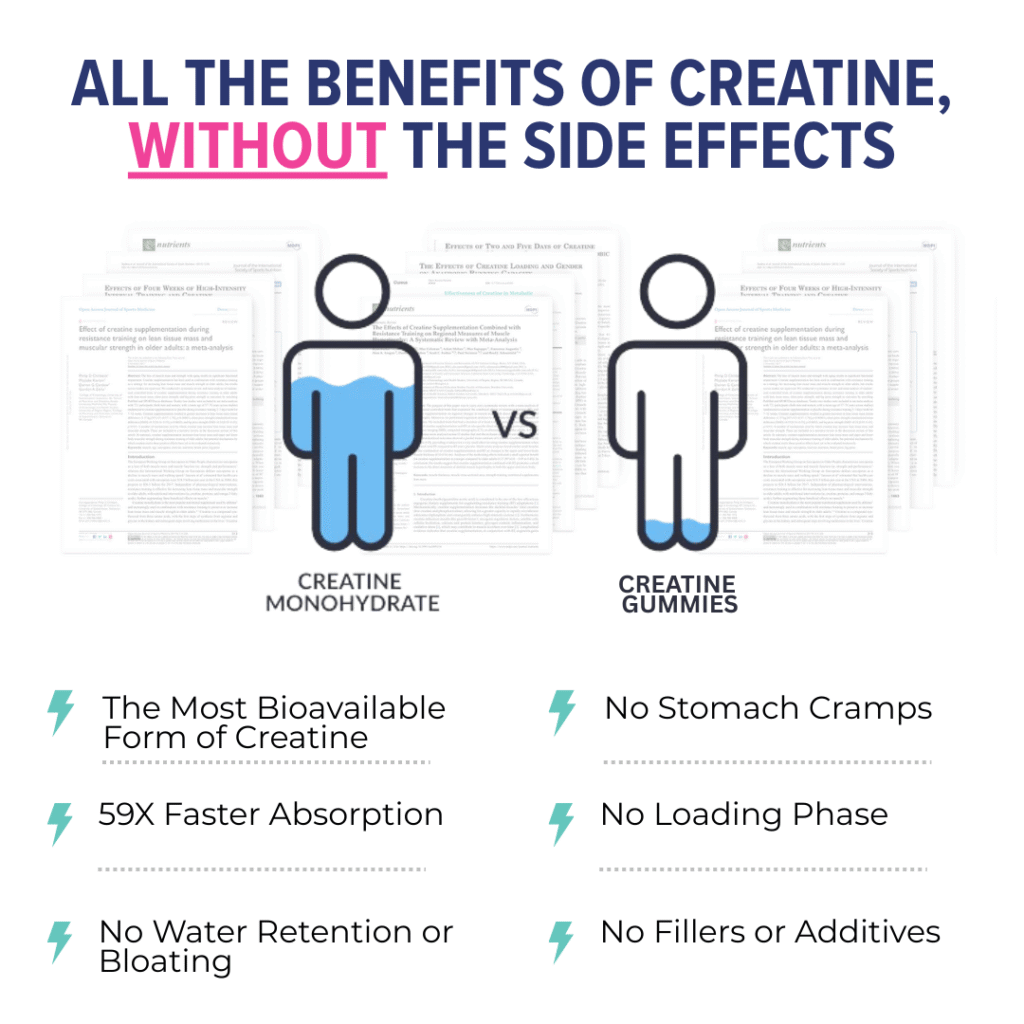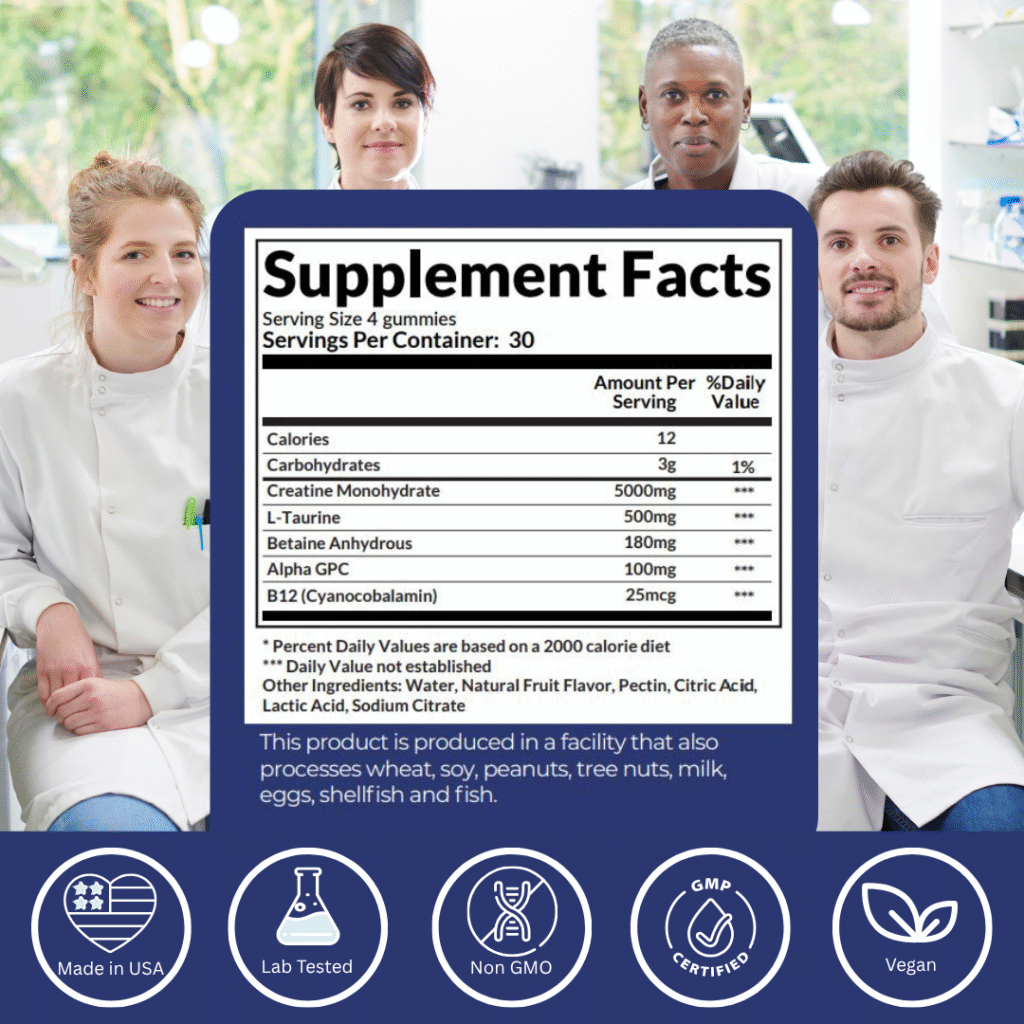If you’re like most runners I know, you’ve probably dismissed creatine as “that bodybuilder supplement” that has nothing to do with endurance performance.
But, recent research indicates you may be very wrong and it could be costing you significant gains in training adaptation, recovery, and race-day performance.
So, in this article, we’re going to dig deep into…
- What creatine is and how our updated understanding of how it works has debunked the myth that it’s only for bodybuilders
- The research on the specific benefits of creatine for endurance athletes
- The simple daily protocol that enhances recovery without weight gain
- Which runners benefit most (and who should skip it entirely)
What Creatine Actually Is (And Why Everything You Thought You Knew Is Wrong)
Despite the common misconception, creatine isn’t some synthetic chemical cooked up in a lab to make people bulky.
The reality is that your body produces creatine naturally every single day.
Your liver, kidneys, and pancreas manufacture creatine from three simple amino acids: arginine, glycine, and methionine.
You also get creatine from foods such as red meat, fish, and chicken.
The problem is that even if you eat meat regularly, you’re only getting 1-2 grams daily from your diet (and as we’ll detail later, you need at least 3-5 grams to see benefits).
Unfortunately, your body also loses about 1-3 grams of creatine every day through normal cellular processes.
Even more challenging, your natural production can’t keep up with optimal levels, especially if you’re training hard.
The practical takeaway: most endurance athletes are operating with suboptimal creatine stores without even knowing it.
📚 Creatine’s role in energy production
The myth about creatine only being for weight lifters and not endurance athletes stemmed from our misunderstanding of how creatine contributes to energy production.
Researchers initially thought creatine only supplied energy for short, explosive bursts.
While this is true, it doesn’t take into account all the “downstream” effects this can have.
And it’s these cascade of benefits that extend far beyond just ATP production that is making scientist understand just how beneficial creatine can be for endurance athletes.
So, what does creatine actually do?
Your muscles store creatine as phosphocreatine.
Phosphocreatine is a form of stored energy in the cells. It helps your body produce more of a high energy molecule called ATP.
ATP is the energy source we use for immediate power like when surging, running uphill, and lifting weights.
So you can see what we initially thought creatine wouldn’t be a huge benefit to endurance athletes.
Sure, more energy for your kick or when surging is great, but these are minuscule elements of endurance performance.
📚 Even endurance athletes benefit from increased ATP
We are now understanding that ATP use isn’t just limited to these small bursts of energy when exercising.
The same ATP that powers your muscles during exercise also fuels the recovery process..
Your cells don’t just need to clear metabolic waste. They rebuild damaged proteins, repair cellular structures, and restore glycogen stores.
This all requires energy.
And creatine supplementation enhances your cells’ ability to regenerate ATP during the recovery window
Furthermore, when your phosphocreatine stores are optimized, you can maintain better form and generate more force during the final reps for interval workouts and strength training.
The final element we need to address is how energy availability affects the microscopic processes that determine your progress.
Muscle protein synthesis and cellular repair are highly energy-dependent processes. Even more challenging, these processes compete with other cellular functions for available ATP.
Creatine supplementation provides additional energy specifically where it’s needed most—inside your muscle cells.
The Research on How Creatine Helps Endurance Athletes
So now that we have a much better understanding of what creatine is, how it works, and the role ATP can play in a myriad of processes, what does the actual research say about the benefits in can provide for endurance athletes?
Improved Recovery
- 5 Research Papers
- Significant Effect
Recovery is probably one of the most critical (and under appreciated) aspects of training.
You can schedule the most optimal, sophisticated workouts in your training build-up, but if you don’t properly recover between these sessions then there is no benefit.
Luckily, there is compelling evidence that creatine helps mitigate muscle cell damage and decrease markers of inflammation, such as creatine kinase (CK) and lactate dehydrogenase (LDH), following prolonged efforts.
Specifically…
- Research shows creatine supplementation reduces muscle cell damage and inflammation following marathon-distance efforts [2].
- Additional studies demonstrate reduced pro-inflammatory markers and muscle soreness after 30km races [3].
- Creatine has been shown in multiple studies to increase the energy stores available to aid in recovery directly after hard sessions.
- Likewise, studies have shown that creatine can enhance cellular repair and protein synthesis [7].
- Finally, creatine enhances the hydration in your muscles, which supports optimal cellular function and may contribute to improved recovery [8].
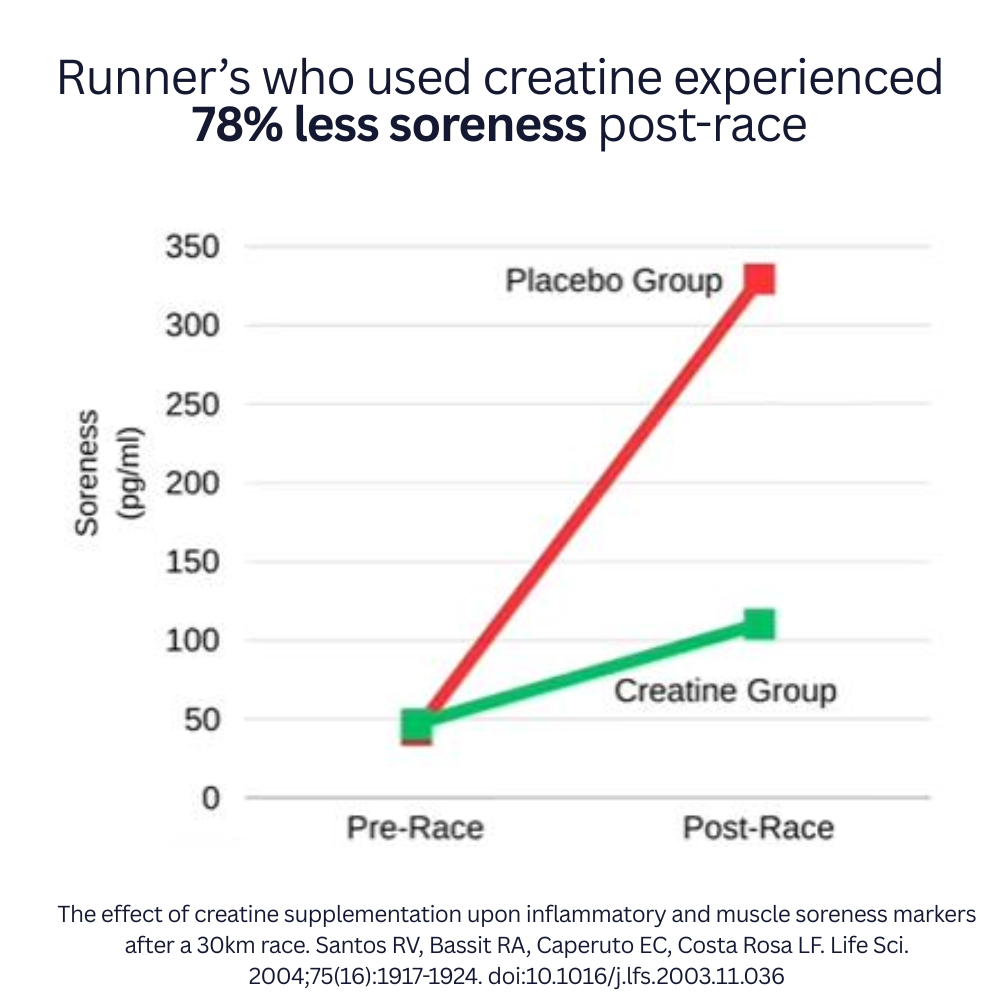
The practical outcome is that you’ll perceive less delayed onset muscle soreness, quicker return to training, and enhanced tissue repair.
Enhance Muscle Strength Even as You Get Older
- 5 Research Papers
- Significant Effect
Age-related muscle loss is one of the biggest threats to long-term running performance and injury prevention.
Starting around age 30, most adults begin losing 3–8% of muscle mass per decade. For runners, this translates to weaker glutes, reduced power output, and higher injury risk with each passing year.
Luckily, there is compelling evidence that creatine monohydrate is one of the most effective and safe compounds for preserving lean mass and enhancing strength, particularly in adults over 35.
Here’s a brief look at what literature says…
- Research shows creatine supplementation during resistance training in older adults resulted in significantly greater gains in lean tissue mass and muscular strength compared to placebo [1].
- Meta-analysis of 22 studies showed older adults supplementing with creatine gained ~1.4 kg more lean mass on average than non-users during training [2].
- Studies demonstrate that creatine helps maintain power output and muscle function even during periods of reduced training or injury recovery [3].
- Research indicates creatine supplementation enhances the muscle protein synthesis response to resistance training in older adults [4].
- Finally, creatine has been shown to improve bone mineral density in older adults when combined with resistance training [5].
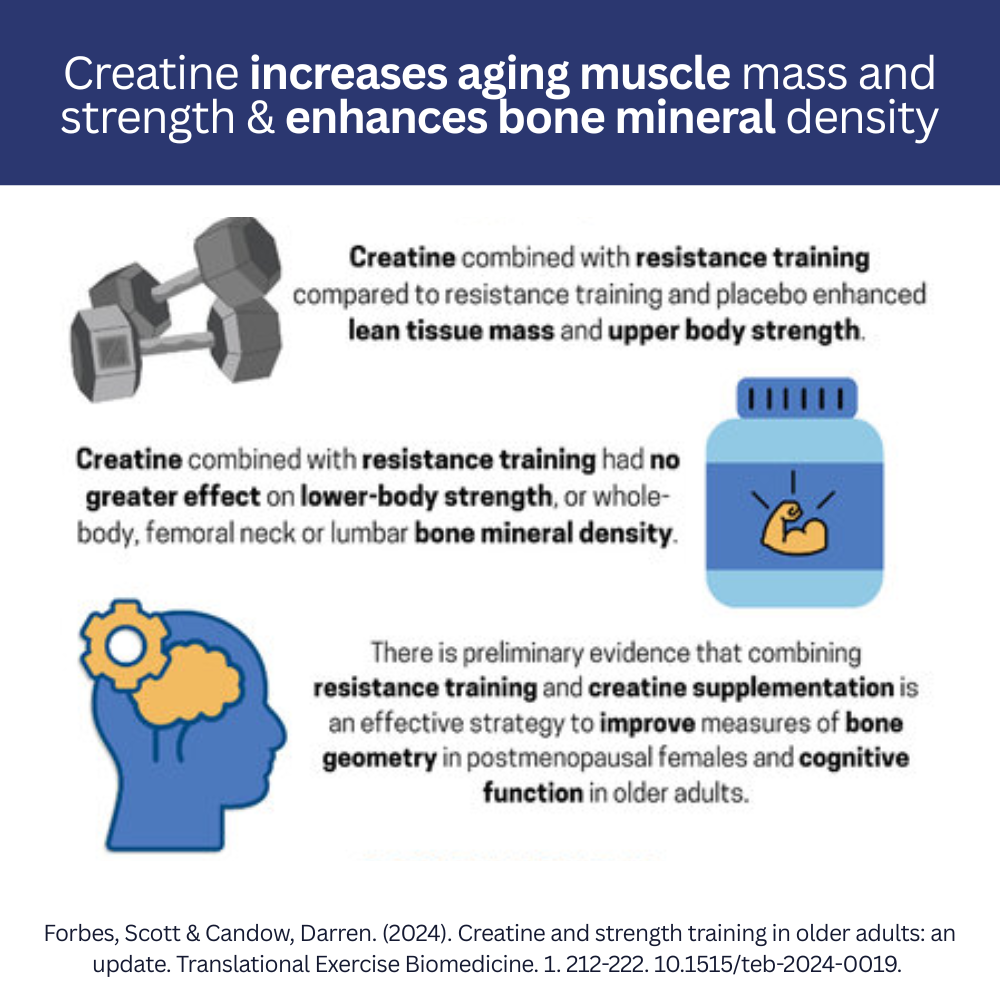
The practical outcome is greater muscle retention, reduced injury risk, and better metabolic recovery after each session—allowing you to maintain running performance well into your later decades.
Improve Endurance & Stamina
- 5 Research Papers
- Significant Effect
Beyond ATP, creatine plays a direct and powerful role in sustaining high-effort performance, improving aerobic and anaerobic efficiency, and helping athletes train longer with less fatigue.
Specifically…
- Newer studies suggest creatine enhances aerobic metabolism by improving mitochondrial efficiency and biogenesis (creation of new mitochondria), especially when combined with endurance training [1].
- Research shows creatine increases mitochondrial efficiency and increased the production of new mitochondria [2] which can improve aerobic performance.
- Creatine acts as a buffer, helping neutralize hydrogen ions, which are the reason we get that burning feeling (often misattributed to lactic acid) at the end of workouts and races [4].
- Research indicates creatine supplementation attenuated lactate accumulation and improved fatigue resistance during repeated effort [5].
- Finally, studies show creatine may improve ventilatory threshold—the point where breathing increases significantly during exercise [6].
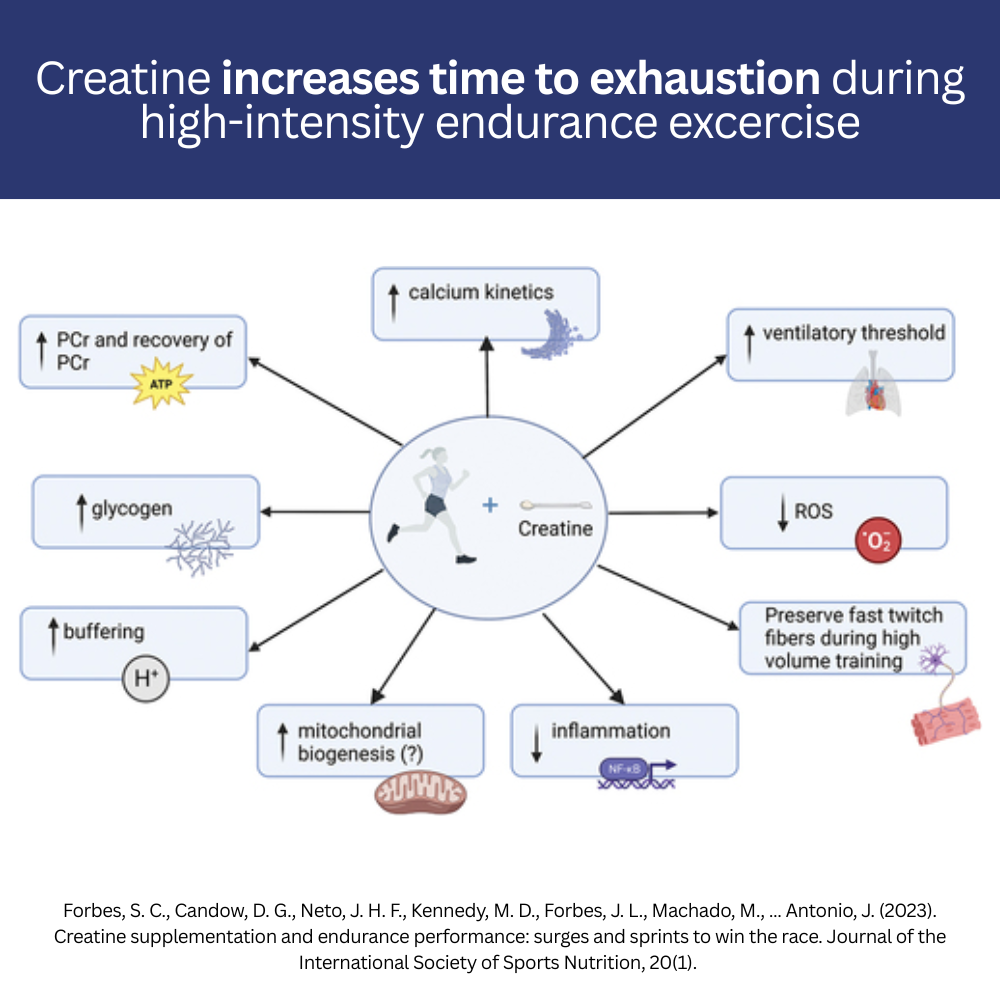
The practical outcome is better stamina, improved energy utilization during long efforts, the ability to maintain pace longer during tempo efforts and threshold workouts, and less bonking during races.
Increase Glycogen Storage
- 5 Research Papers
- Significant Effect
When it comes to endurance performance, glycogen is king.
It’s the primary fuel your muscles use during long-duration efforts—and once it’s gone, so is your speed, power, and drive.
What most endurance athletes don’t realize is that creatine also increases your muscles’ ability to store glycogen.
Specifically…
- Research shows creatine increases glycogen storage by up to 50% when taken alongside carbohydrates [1].
- Studies demonstrate creatine enhances cellular hydration and glucose transporter activity (GLUT-4), which improves glucose uptake into muscle tissue [2].
- Creatine supplementation with carbohydrate loading resulted in significantly higher muscle glycogen content compared to carbohydrate alone [3].
- Research indicates creatine increased muscle glycogen resynthesis post-exercise, suggesting an enhanced ability to store fuel during recovery [4].
- Finally, creatine helps maintain glycogen stores during training, allowing for more consistent energy availability across multiple sessions [6].
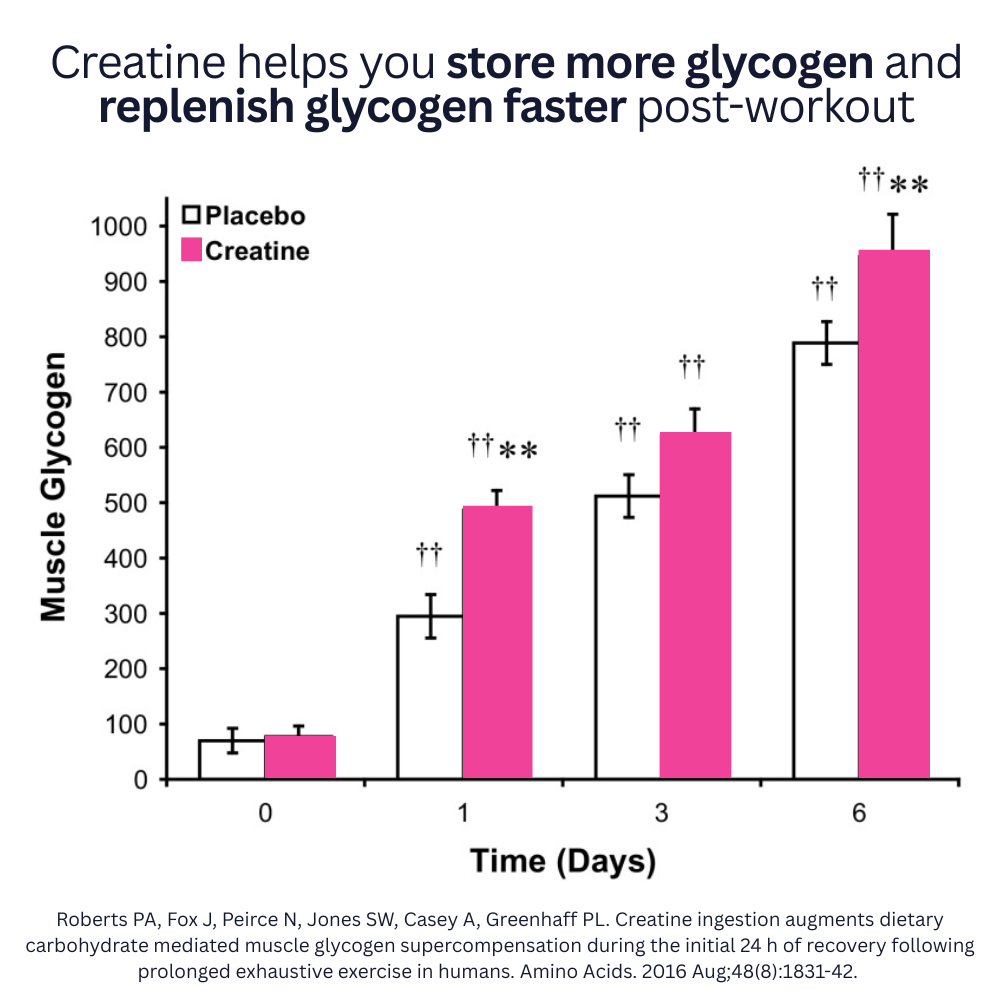
The practical outcome is enhanced fuel storage capacity, faster glycogen replenishment between training sessions, and improved energy availability during long efforts
Should You Try Creatine (And if So, How)?
In looking at the research, I think almost every runner will benefit from supplementing with creatine.
Not only are the performance and health benefits well-supported across multiple studies, but there are very few, if any, contraindications or safety concerns.
That said, if you fall into one of these three groups, creatine supplementation is probably one of the most effective things you can do…
Vegetarian and vegan runners should prioritize it most.
Plant-based diets provide zero dietary creatine, leaving you with suboptimal muscle stores [13]. You’re essentially running with a partially empty gas tank.
Masters athletes (40+) are particularly good candidates.
Research shows creatine supports recovery, bone health, and cognitive function—all declining with age [14].
Women runners also benefit tremendously from creatine supplementation.
2021 study published in Nutrients also highlighted that creatine can help women support muscle strength, bone density, mood regulation and hormonal fluctuations, especially as estrogen declines with age.
- How to take creatine
As for how to take creatine, here are the most important points…
Start with 3-5g daily of creatine monohydrate.
Research shows this dose effectively saturates muscle stores when used consistently [18].
You don’t need a loading phase.
The research has shown 3-5g consistently is enough to get the benefits.
Take it consistently.
Creatine works best when the muscles are saturated and occasional doses won’t fully saturate muscles.
Timing doesn’t matter
Because creatine works best when the muscles are saturated, and this takes 14-30 days, the time of day won’t matter much once you start taking it. Take creatine whenever works best for your schedule.
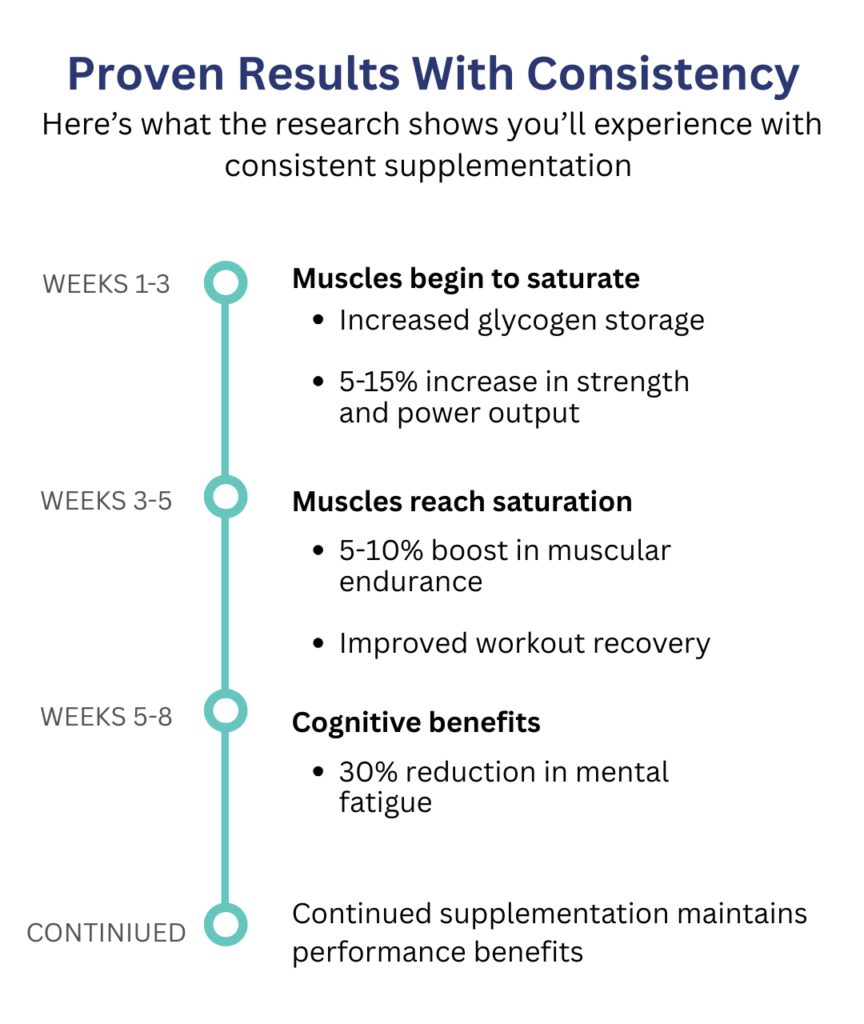
- What kind of creatine works best
Micronized creatine monohydrate is the most highly studied and validated form of creatine on the market.
Nothing else has consistently produced better results, and in many cases, other “fancier” forms have actually performed worse.
Don’t be fooled by marketing gimmicks touting the other types of creatine that can be better absorbed or that are more effective.
The research shows they aren’t any better and just more expensive [12]
MAS Creatine: Developed Specifically for Endurance Athletes
Most creatine supplements suck for runners because they’re not designed for the specific needs and challenges of endurance athletes.
Bodybuilders don’t mind grainy powders and they consider stomach distress a mild inconvenience.
But runners need convenience and something that is going to be easy on their stomach. GI issues are no joke when you’re miles from a bathroom.
That’s why we created MAS Creatine. Creatine gummies designed for the needs of endurance athletes
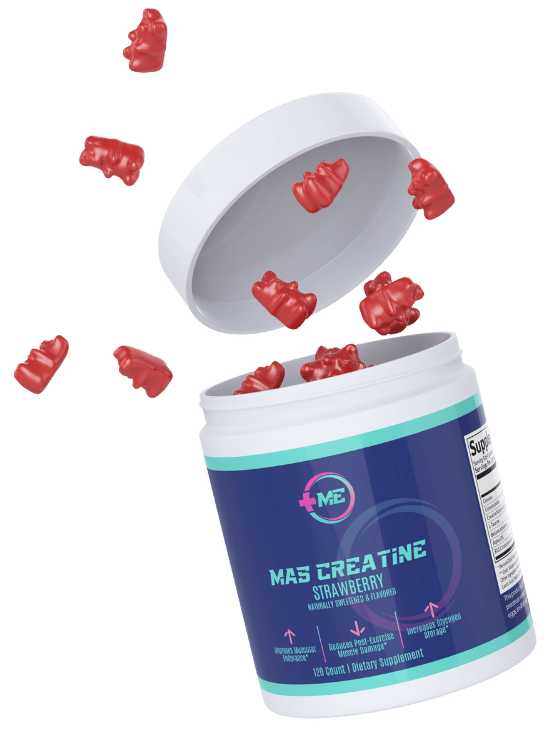
MAS Creatine: Developed Specifically for Endurance Athletes
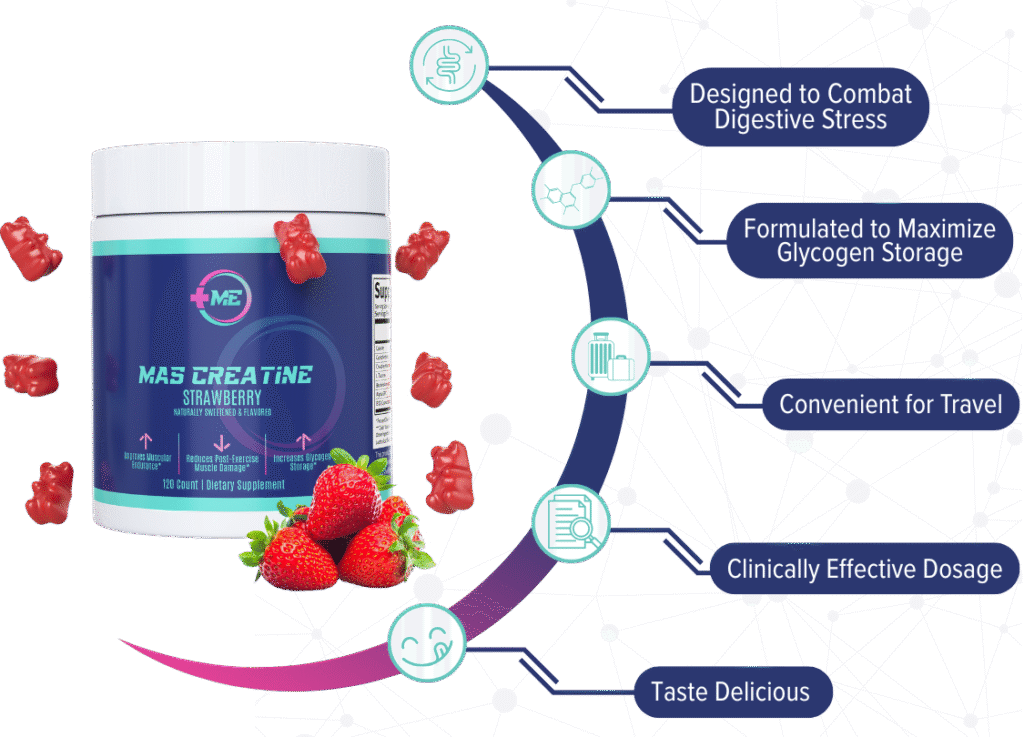
Most creatine supplements suck for runners because they’re not designed for the specific needs and challenges of endurance athletes.
Bodybuilders don’t mind grainy powders and they consider stomach distress a mild inconvenience.
But runners need convenience and something that is going to be easy on their stomach. GI issues are no joke when you’re miles from a bathroom.
That’s why we created MAS Creatine. Creatine gummies designed for the needs of endurance athletes
What Makes MAS Creatine Better?
We’ve formulated our Creatine Monohydrate gummies to provide the purest and most effective form of creatine available, with no fillers or unnecessary additives.
Our gummies are…
- Designed to be absorbed quickly so they are gentle on the stomach
- Formulated to avoid the bloating you typically find with traditional creatine powders
- 100% soluble to eliminate water retention and increase absorption
- Delicious, convenient & easy to take with you so you stay consistent
So what you get is pure, fast-acting creatine that fuels your muscles, enhances your performance and helps you recover every time you train.
- Only what you need. No Bloat. No Gas. No additives
Our gummies are made with micronized creatine, which is a 100% soluble type of creatine with superior bioavailability.
That means they are specifically formulated to be absorbed quickly so it’s gentle on the stomach, eliminates water retention, and doesn’t give you the bloated feeling you may have experienced with traditional creatine powders.
Plus, unlike a lot of gummies on the market, our gummies contain no fillers or unnecessary additives.
What that means for you is that you get a pure, fast-acting creatine that fuels your muscles, enhances your performance and helps you recover every time you train.
- Formulated by Sports Scientists
We spent almost a year in development with our sports science team and manufacturer to make sure we got this product just right!
We dove into the research on what types of creatine were based absorbed and how we could formulate to eliminate many of the traditional drawbacks of creatine.
Then we considered the delivery mechanism. Traditional powders require mixing, often taste bad, make precise dosage difficult and are hard to take with you.
The result is a gummy that is not only delicious, but cutting-edge in its formula.
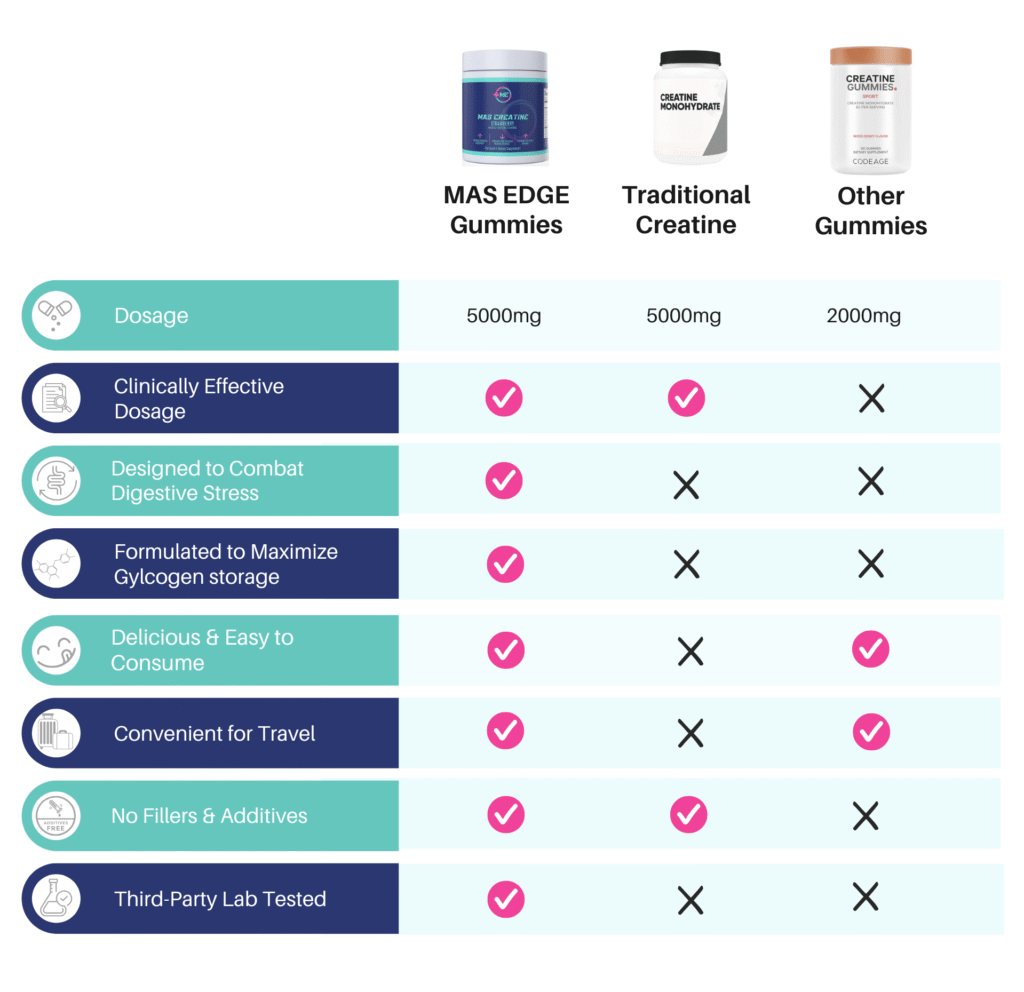





The Bottom Line
Creatine Monohydrate is one of the most researched and effective performance-enhancing supplements available.
The question isn’t whether creatine works for endurance athletes – the research clearly shows it does.
The question is whether you’re ready to stop leaving performance gains on the table.
With the right approach and a formula designed specifically for runners creatine can become the missing piece in your performance puzzle.






